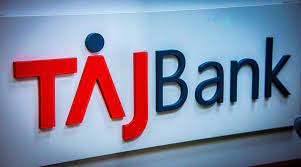BUSINESS
TAJBank, NIPOST Collaborate on Public-Private Partnership Initiatives

…..TAJBank, NIPOST Collaborate on Public-Private Partnership Initiatives
By Tony Obiechina, Abuja
Nigeria’s fastest growing non-interest banking services provider, TAJBank Limited and Nigerian Postal Service (NIPOST) have formalized a new public-private partnership (PPP) initiative with a view to working together for mutual and the nation’s socioeconomic benefits.
The partnership between the non-interest lender and the postal services agency was formalized at the NIPOST Head Office in Abuja, where both parties met for collaborative discussions on how they can push further on initiatives targeted at public-private endeavours with the aim of adding value to the nation’s financial inclusion drive and enhancement of postal services in the country.
Speaking during the event, TAJBank’s Managing Director/CEO, Mr. Hamid Joda, thanked the Postmaster General/CEO of NIPOST, Ms. Tola Odeyemi, for the opportunity given the bank to partner the Service in the management’s efforts to work hand in hand with the firm, riding primarily on branch expansion with NIPOST offices thus expanding the innovative products and services of the non-interest lender.
The world-class banker told reporters that the collaboration with NIPOST hinges on 3Rs – rent, refurbish and rebrand, while also commenting on the latest network expansion of TAJBank’s services into the Lagos axis that it was “another step taken by the board and management of the bank to add value to individuals and business owners’ efforts in terms of cost-free, real-time services and make accessible to them innovative user experience with a vast bouquet of functionalities.
“Indeed, the point here is that at TAJBank, we are about a strategy of cost-saving, in addition to leveraging our services on world-class ICT infrastructure and solutions nationwide, determined to promote inclusion at the grassroots not through POS or other channels alone but through human interface with prospective customers”, Joda assured.
Commenting on the collaboration with TAJBank, the Postmaster General/CEO of NIPOST commended the non-interest lender’s collaboration strategy and expressed optimism that working together would be mutually beneficial to NIPOST and TAJBank.
Read Also: UNICEF Call: 119 Jobs for January & February 2024 | Apply Now
Odeyemi enthused: ‘TAJBank needs no introduction and as soon as I had the opportunity to be a part of this initiative, it was a resounding yes. The brand speaks for itself and is here to provide cost-efficient and interest-free banking services to everyone.”
During a brief chat with journalists at the side-lines of the event, the bank’s Executive Director, Mr. Sherif Idi, maintained that “what we are doing here today is to demonstrate to Nigerians and indeed the global community that TAJBank is fully determined to show how we intend to redefine non-interest banking services as a customer-focused lender and a collaboration with NIPOST which is a very Nigerian parastatal with history aligns with this strategy – that is ready to give all that it takes to surpass customer expectations wherever we are located.
“As our mantra clearly states, our only interest is our customers and I wish to mention that as a country, our history is key. It gives us a roadmap to where we are coming from and where we are going to. TAJBank is a proudly Nigerian institution and with a partnership with NIPOST, we can rebuild our heritage, re-tell our story and above all contribute significantly to the nation’s economy”, Idi added.
…..TAJBank, NIPOST Collaborate on Public-Private Partnership Initiatives
BUSINESS
PenCom Slams Seven Mortgage Banks for Violating Housing Loans Guidelines

By Tony Obiechina, Abuja
The National Pension Commission has directed Pension Fund Administrators and Pension Fund Custodians to immediately stop accepting or processing equity contribution applications submitted by seven Primary Mortgage Banks over alleged non-compliance with its housing loan guidelines.
This was contained in a circular by the Head of Benefits and Insurance Department, Obiora Ibeziako, and addressed to PFAs and PFCs.
The PenCom circular read, “Following the cited letter, the commission instructs that Pension Fund Administrators, including Closed Pension Fund Administrators and Pension Fund Custodians, immediately stop accepting or processing equity contribution applications submitted by the following Primary Mortgage Banks.
”It listed the affected institutions as Jigawa Savings & Loans Limited, FHA Mortgage Bank Limited, Delta Trust Mortgage Bank Limited, AG Mortgage Bank Limited, Infinity Trust Mortgage Bank Plc, First Trust Mortgage Bank Limited, and Mutual Alliance Mortgage Bank Limited. “Please be guided,” the letter read in part.
According to the spokesman of PenCom, Ibrahim Buwai, the decision followed the failure of the affected mortgage banks to generate the loans for which pension funds had been approved.
He said, “When you have policies like these, you will have rules and guidelines. The whole purpose of giving access to RSA holders is to enable them to own houses through mortgages.
“The whole thing is meant for those who apply and get approved. The monies that get approved are meant to enable them to pay equity through mortgages. So, it was discovered that some of the primary mortgage institutions were not generating mortgages.
“That is just the long and short of it. If that is the case, that means they are not complying with the regulations. That is the reason for their blacklisting.”
The Equity contribution for residential mortgage was introduced in September 2022 by PenCom.
This is the portion of funds that an RSA holder can apply from the RSA balance towards the payment required to secure a residential mortgage. RSA holders are permitted to utilise a maximum of 25 per cent of their RSA balance for this purpose.
As of the end of the first quarter of 2025, about 24,582 RSA holders have benefited from the scheme to the tune of N149.84bn.
Oil & Gas
Nigeria Must Act Fast to Drive Electric Vehicle Adoption – MEMAN

Major Energies Marketers Association of Nigeria (MEMAN) has warned that Nigeria cannot afford to be left behind in the global shift to clean mobility, calling for urgent collaboration to fast-track Electric Vehicle (EV) adoption.
Its Executive Secretary, Clement Isong, gave the warning during an online webinar titled “Accelerating Electric Mobility Adoption in Nigeria by Unlocking Downstream Potential” on Monday.
Isong said that the association had already taken practical steps by installing 12 EV charging and battery-swapping stations alongside five aftersales facilities across the country.
“Collaboration among regulators, investors, and private sector stakeholders is critical to building a viable EV ecosystem in Nigeria.
“MEMAN remains committed to fostering dialogue and innovation in the downstream sector,” Isong said.
He said that with transportation accounting for 28 per cent of Nigeria’s greenhouse gas emissions and rising fuel prices burdening households and businesses.
Director of Operations, Nigerian Midstream and Downstream Petroleum Regulatory Authority (NMDPRA), Dr Mukaila Oseni cited the International Energy Agency’s forecast that the number of EVs worldwide will rise to 145 million by 2030.
“Nigeria must diversify its energy mix, lower transportation costs in the long run, and reduce carbon emissions.
“EV adoption is no longer optional. It is essential,” Oseni said.
He, however, admitted challenges remain: high upfront vehicle costs, weak charging infrastructure, unreliable grid power, and low consumer awareness.
Oseni added that NMDPRA had been reviewing regulatory policies to encourage private investment, technology adoption, and innovative business models.
He further urged stakeholders to leverage the nation’s vast fuel retail network as future charging hubs, while also considering interim options such as compressed natural gas (CNG) and liquefied petroleum gas (LPG) as cleaner alternatives.
The webinar, hosted by MEMAN’s Competency Centre, highlighted financing models, local vehicle assembly, and consumer education as critical tools to make EVs accessible and affordable.
With the world moving rapidly towards electrified transport, participants agreed on one point: Nigeria must act decisively to embed EVs in its energy transition strategy or risk being left behind.
| ReplyReply allForwardAdd reaction |
BUSINESS
FG Bows to NLC Pressure, Appoints Chairman for PenCom

The Federal Government has bowed to the threat of a strike by the Nigeria Labour Congress for not constituting the governing board of the National Pension Commission by appointing Opeyemi Agbaje as the chairman.
The news of Agbaje’s appointment was confirmed by impeccable NLC sources, as well as some industry officials.
At the end of its August 13th meeting, the Central Working Committee of the NLC demanded the constitution of the PenCom Governing Board in line with the law within seven working days.
The NLC also asked PenCom to submit to the NLC a full status report of the funds within these same seven days.Spokesman for PenCom, Ibrahim Buwal, said there was no official confirmation from the presidency yet as to Agbaje’s appointment.
Section 19 of the Pension Reform Act 2014 provides for the establishment of a 16-member Governing Board for PenCom. The Chairman, Director-General, and four full-time Commissioners are to be appointed by the President, subject to confirmation by the Senate.
The remaining ten members are representatives of key stakeholder institutions, including the Nigeria Labour Congress, the Trade Union Congress, the Nigeria Union of Pensioners, and the Nigeria Employers’ Consultative Association, among others.
Meanwhile, the newly-appointed chairman of the pension industry regulator, Agbaje, is the Chief Executive Officer of RTC Advisory Services Ltd (formerly Resources and Trust Company Ltd). RTC Advisory Services Ltd is a strategy and business advisory firm with two main strategic business units-RTC Strategy and Advisory and RTC Policy.
Agbaje has experience in the banking sector. He holds a Master’s degree in Law from the University of Lagos and an MBA from IESE Business School, Spain in 1997. He was previously on the board of the Lagos State Security Trust Fund for two terms between 2011 and August 2019.
























